|
Late last week there was a research study published in Science that shared how young children view brilliance and gender. Among other tasks, children were told stories of brilliant (aka, “very, very smart”) people without any hint at gender and then asked to choose a picture of the person they thought the story was about.
The punch line is that at 5-years of age, all the kids are more likely to identify the brilliant person as someone of their gender. But, because there has to be a but, by 6-years of age, both boys and girls are more likely to say the brilliant person is a male. Simply said, by 6-years of age, kids think females are less likely to be brilliant. If you don’t want your child to be a statistic and fall into the trap of thinking that females aren’t as smart as males, here are five things you can start (or continue) doing ASAP…no matter how young or old your kids are!
JOIN Dr. Stephanie for Facebook LIVE
Monday 1/30 @ 10:00am CLICK the link. LIKE the page. Get parenting tips that work in the real world!
0 Comments
Full disclosure, this week’s blog post was inspired by personal events. Here’s the set-up. I was heading out to the grocery store and asked my nine-year-old son if he wanted to come. His response was, “Sure, I want to get something anyway.” I said, “Great, what do you want?” He said, “Some chocolate milk, if that’s okay.” I agreed and we headed out. At the store he asked permission then scooted off to grab his drink. As we finished up, I asked him twice if he needed or wanted anything else, and also asked if he was sure he had what he wanted for dinner (which had been deemed a “fix up” meal meaning leftovers or whatever else can be scrounged). Both times he said he was good, he didn’t need anything else. Great. Fine. All was well. He even helped unload the car and unpack the bags when we got home. Fantastic! Flash-forward 30-mnutes. We were prepping dinner. He realized he didn’t have the particular kind of pasta that he wanted (Side note: apparently the five varieties in the pantry were not up to par, but I digress). My perfectly pleasant and chipper shopping partner suddenly lost his memory and rewrote history saying, “Mom, you didn’t remind me to get what I needed at the store! I said I NEEDED something and you didn’t remind me and now I have NO dinner! Why didn’t you REMIND me!” Okay. That’s not how I remember it. Here’s what the thought bubble above my head read: Umm…are you kidding me! YOU said you wanted chocolate milk. And then I asked you TWICE if you needed or wanted anything else and you said NO! And now you’re crying and yelling at ME?! What the…! As I considered letting those words escape, I had a revelation—it was a trap! A trap I have fallen into many times in the past and one that I did not want to spend my weekend clawing my way out of. My son’s memory had been hijacked and nothing I said or did in that moment would have made a difference. Let’s get technical here. The areas of my son’s brain that are devoted to logic and reason were abruptly overcome by his emotional control center. He was coming at me with 100% emotion and I was thinking like a rational human being (at least in that moment). If the two of us kept going, I’m certain that his emotionally induced memory loss would have triggered my very own emotional storm surge…and that does not make for a fun Saturday night. Like I said, I’ve been in plenty of these storms and, fortunately, I was able to see this one coming. How did I handle the pre-dinner drama at our house? I kept my mouth shut (choking on the urge to provide a reality check). Then, when there was a two second lull in the rant I said, “It’s really tough to not have the pasta you want.” My son said, “Yes!” Then I turned around and continued what I had been doing. He complained and slammed around in the pantry for a few minutes while I resisted the urge to tell him to be careful and not take his feelings out on the canned goods. Then he emerged and asked me to help him get a pot. I did. He was huffy for about ten more minutes and then it was done. Why did it end? Because his brain balanced out, emotions and logic reached equilibrium. We never had a conversation and I never got to refresh his memory, but that was fine because it was never about me or what I said or didn’t say. It was about his feelings and frustration. I certainly didn’t want him to remember having a huge argument with me on top of all that. You’ve probably been in similar situations with your kids…toddlers who shout, “You said so!” when you know those words never crossed your lips. Children who insist you never gave a 5-minute warning or reminder (even though you actually gave three). Teens who swear you granted permission for things you’ve never even heard about before. These memory lapses and revisions of history happen all the time. So, what do you do when your child’s memory is hijacked? Here are five tips to handle these memory lapses and, better yet, help prevent them:
JOIN Dr. Stephanie for Facebook LIVE on Monday 1/23 @ 10:00am CLICK the link. LIKE the page. Get parenting tips that work in the real world!
For all the things you say to your child day in and day out, what’s really most important? As far as statements that mean the most in the long run in terms of strengthening your relationship with your child and helping them build confidence and resilience, the answer may be simpler than you think. In reality, the words your child needs to hear from you are probably statements you’re making every day. Here’s a list of the top three things that every child needs to hear as well as some quick tips to help you make it happen.
2. THANK YOU Showing gratitude is a great way to help your child feel good about their contributions and accomplishments. It also increases the likelihood that your child will follow through again in the future. So, when those shoes finally get picked up and moved to their appropriate resting place or the homework gets done, offer a simple and genuine thank you so your child knows you recognize their effort. Keep these things in mind to make this work for you and your kids:
3. NO Your child may pitch a fit when you say no, but it is a word they need to hear in order to feel safe, loved, and important. When parents are overly permissive, kids don’t feel cared for or valued. I hear this first-hand from teens who complain about curfews while admitting that they understand when they have one and feel bad for peers whose parents don’t seem to care enough to set them. So, when your child is giving you a run for your money just because you won’t; buy, get, or allow something, remember that you are actually giving your child exactly what he or she needs. Here are a few tips so you can say no like a champ:
JOIN Dr. Stephanie for Facebook LIVE on Monday 1/16 @ 9:00am CLICK the link. LIKE the page. Get parenting tips that work in the real world! |
Stephanie O'Leary, Psy.D.
Sharing practical strategies that help parents rediscover joy in their children (even when someone's crying, the phone is ringing, and it smells like the house may be burning down) Archives
October 2017
Categories |

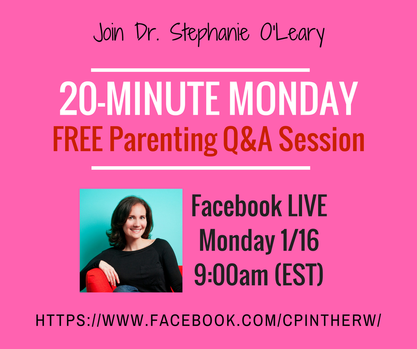
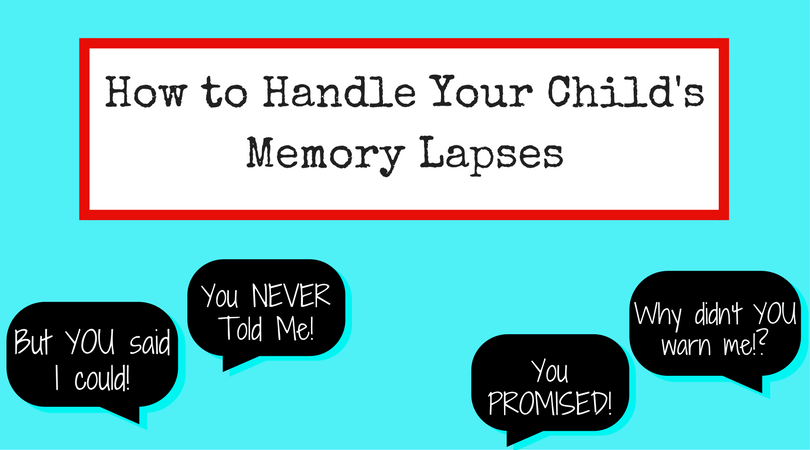
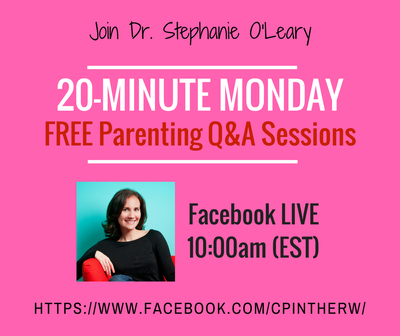

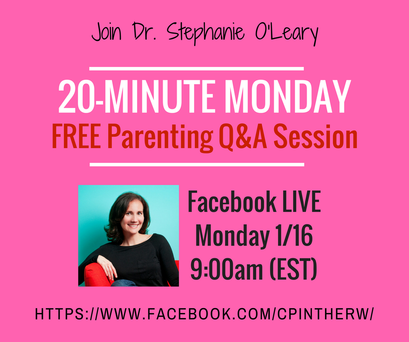
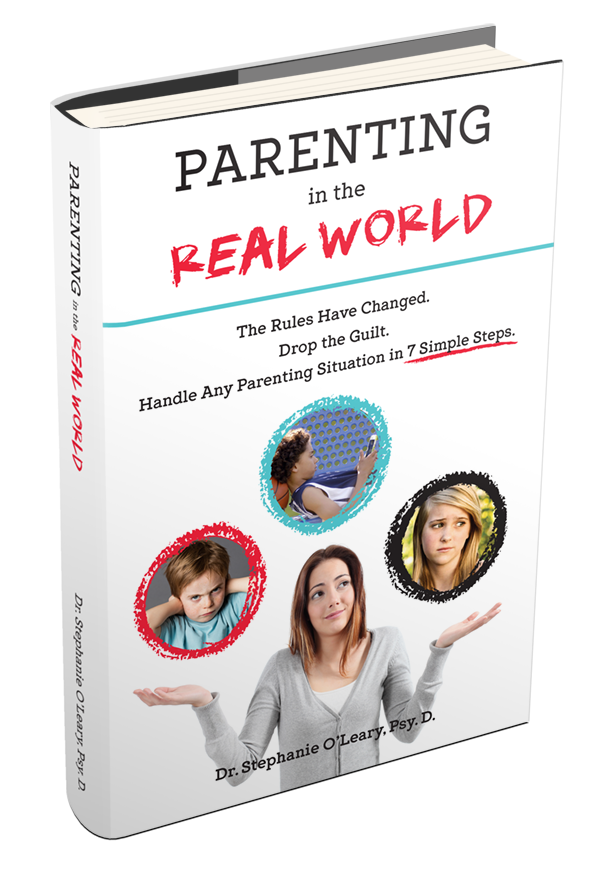

 RSS Feed
RSS Feed